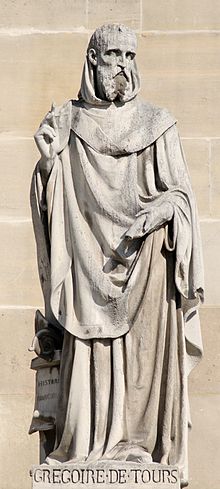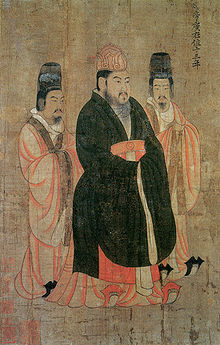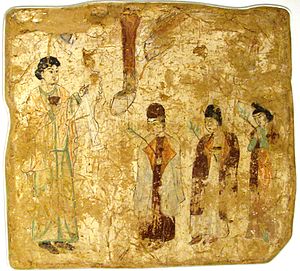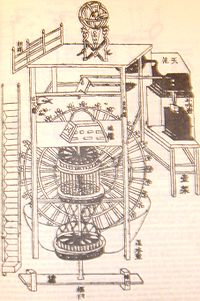Our story
This Chapter
|
|
June 3, 2011 The most important notion to take away from this chapter is pinned down by the word virtus, and don't bother consulting a dictionary for it won't be of much help. Its meaning is strongly embedded in sixth-century Gallia, which, roughly speaking, is now France, and is concisely explained by Earnest Brehault, one of several translators of some important works by Saint Gregory of Tours (539–594).* Gregory, who was at once a bishop and a historian, wrote History of the Franks, a blend of historical facts as he knew them and an example of a way of thinking.* 3 Modern scholars are also taking a hard look at the bishop's language, which is ungrammatical Latin. He himself was well aware of his literary shortcomings but decided to write anyway because "no grammarian skilled in the dialectic art could be found to describe these matters either in prose or verse" and besides "few understand the learned words of the rhetorician but many the rude language of the common people"—an excellent admonition for writers throughout the ages. Here is how he sets the stage for his History of the Franks: 5 "As I am about to describe the struggles of kings with the heathen enemy, of martyrs with pagans, of churches with heretics, I desire first of all to declare my faith so that my reader may have no doubt that I am Catholic. I have also decided, on account of those who are losing hope of the approaching end of the world, to collect the total of past years from chronicles and histories and set forth clearly how many years there are from the beginning of the world. But I first beg pardon of my readers if either in letter or in syllable I transgress the rules of the grammatic art in which I have not been fully instructed, since I have been eager only for this, to hold fast, without any subterfuge or irresolution of heart, to that which we are bidden in the church to believe, because I know that he who is liable to punishment for his sin can obtain pardon from God by untainted faith." 6 With such an introduction, how can we be but grateful and sympathetic? 7 Ernest Brehaut emphasizes how high on Gregory's mind is the supernatural. Gregory's preoccupation is especially with the miracles of Saint Martin of Tours (316–397),* whose tomb became a major draw thanks to virtus. It is that very word that makes miracles credulous; it is one of two words that keep recurring in Gregory's work, the other being sanctus—holy or sacred. Virtus is a mystic power transmitted from the sacred, be it a person or a thing—for example the dust on Saint Martin's tomb. The natural is perceived as inferior to the supernatural, the sacred. A miracle is the outcome of the supernatural overriding the natural and the most sought after miracles are, for obvious reasons, of the kind the New Testament is full of: healing, even raising from the death. What we now consider a natural recovery from a sickness would be regarded as a miracle. People felt they had a better chance for recovery if they went to shrines and churches to be healed rather than calling a doctor. No wonder then that physicians were few. Gregory himself after having called a doctor decided that secular means were of no avail and sent for some dust from St. Martin's tomb which he put in water and drank; he was soon cured. 8 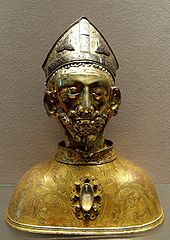 Reliquary for the head of St. Martin, silver and copper, part gilt, from the church at Soudeilles, late 14th century. (Source) 9 It has been said that Gregory's was a primitive society with a primitive interpretation of life, but whatever primitive means it does not, in this context, mean unreasonable. If healing does not occur then there is a perfectly logical explanation for that—a logic, to be sure, marbled with assumptions. The devil, demons, soothsayers, magicians, pagans, pagan gods, and heretics are continually waging aggressive warfare on true virtus with a false mystic potency that can play havoc in the natural world and cause deceitful, malignant miracles. Sure, that false potency is weaker than true virtus, but it can't be ignored and the Catholic faith is the best defense. 10 One may well think that what is good for the goose is good for the gander, and indeed many a nominal Christian worshipped at pagan shrines as well. But with judicial and eclasiastical coercion, literacy and eloquence, and impressive ceremony, all of these on the the Church's side, there can be no doubt that the news spread about Christian miracles well outweighed that of the benign pagan kind. 11 Gregory, in a preface to his History wrote that "with liberal culture on the wane, or rather perishing in the Gallic cities there were many deeds being done both good and evil: the heathen were raging fiercely; kings were growing more cruel; the church. attacked by heretics, was defended by Catholics; while the Christian faith was in general devoutly cherished, among some it was growing cold; the churches also were enriched by the faithful or plundered by traitors—and no grammarian skilled in the dialectic art could be found to describe these matters either in prose or verse; and many were lamenting and saying: 'Woe to our day, since the pursuit of letters has perished from among us and no one can be found among the people who can set forth the deeds of the present on the written page.'" It appears that he himself had little or no instruction in the classical liberal arts. His reading consisted of the Scriptures and works of Christian writers; his contact with pagan literature of the classical period slight. He expressed his attitude toward the clasical literature thus: "We ought not to relate their lying fables lest we fall under sentence of eternal death." As quoted before: "I have been eager only for this, to hold fast, without any subterfuge or irresolution of heart, to that which we are bidden in the church to believe." 12 Not only education, medicine and classically developed jurisprudence fell on hard times. To be a physician was not without risk. When Austrechild, one of king Gunthram's wives, was dying, she accused her two physicians of having given her a bad potion, and asked the king to take an oath to have them executed.* He gave and kept his word. Gregory commented, "Many wise men think that this was not done without sin." As for the law, the Salic Franks had their own legal code. Unlike Roman law, it does not emphasize marriage and the family, inheritance, gifts, and contracts; rather, it fixes monetary or other penalties for damage caused such as killing women and children, striking a man on the head so that the brain shows, and skinning a dead horse without the consent of its owner.* 13 Two methods of proof used in early Germanic law were compurgation and ordeal. In compurgation the accused swore to his own innocence together with a group of "oath-helpers." As for ordeal, in some cases, the accused were considered innocent if they survived the test, or if their injuries healed; in others, only death was considered proof of innocence. (If the accused died, they were often presumed to have gone to a suitable reward or punishment in the afterlife, which was considered to make trial by ordeal entirely fair.) To give the feel of things, here is the liturgical formula for the Christianized form of the judgment of the glowing iron: 14 "After the accusation has been lawfully made, and three days have been passed in fasting and prayer, the priest, clad in his sacred vestments with the exception of his outside garment, shall take with a tongs the iron placed before the altar; and, singing the hymn of the three youths, namely, 'Bless him all his works,' he shall bear it to the fire, and shall say this prayer over the place where the fire is to carry out the judgment: 'Bless, 0 Lord God, this place, that there may be for us in it sanctity, chastity, virtue and victory, and sanctimony, humility, goodness, gentleness and plentitude of law, and obedience to God the Father and the Son and the Holy Ghost.' After this, the iron shall be placed in the fire and shall be sprinkled with holy water; and while it is heating, he shall celebrate mass. But when the priest shall have taken the Eucharist, he shall adjure the man who is to be tried ... and shall cause him to take the communion. Then the priest shall sprinkle holy water above the iron and shall say: 'The blessing of God the Father, the Son, and the Holy Ghost descend upon this iron for the discerning of the right judgment of God.' And straightway the accused shall carry the iron to a distance of nine feet. Finally his hand shall be covered under seal for three days, and if festering blood be found in the track of the iron, he shall be judged guilty. But if, however, he shall go forth uninjured, praise shall be rendered to God." (Source). 15 In pre-modern society, the ordeal typically ranked along with the oath and witness accounts as the central means by which to reach a judicial verdict. One theory has it that trial by ordeal was effective at sorting the guilty from the innocent because defendants were believers. Only the truly innocent would choose to endure a trial; guilty defendants would confess or settle cases instead.* 16 True virtue makes kings win battles; bad virtue makes them lose. Clovis I, king of Franks, prayed to the Germanic god Wodan to help him win a battle against the Alamanii. Things, however did not go well for him: "It came about that as the two armies were fighting fiercely, there was much slaughter, and Clovis's army began to be in danger of destruction. He saw it and raised his eyes to heaven, and with remorse in his heart he burst into tears and cried: 'Jesus Christ, whom Clotilde [his wife] asserts to be the son of the Living God, who art said to give aid to those in distress, and to bestow victory on those who hope in thee, I beseech the glory of thy aid, with the vow that if thou wilt grant me victory over these enemies, and I shall know that power which she says that people dedicated in thy name have had from thee, I will believe in thee and be baptized in thy name. For I have invoked my own gods but, as I find, they have withdrawn from aiding me; and therefore I believe that they possess no power, since they do not help those who obey them. I now call upon thee, I desire to believe thee only let me be rescued from my adversaries." And when he said thus, the Alamanni turned their backs, and began to disperse in flight. And when they saw that their king was killed, they submitted to the dominion of Clovis, saying: 'Let not the people perish further, we pray; we are yours now.' And he stopped the fighting, and after encouraging his men, retired in peace and told the queen how he had had merit to win the victory by calling on the name of Christ. This happened in the fifteenth year of his reign." 17 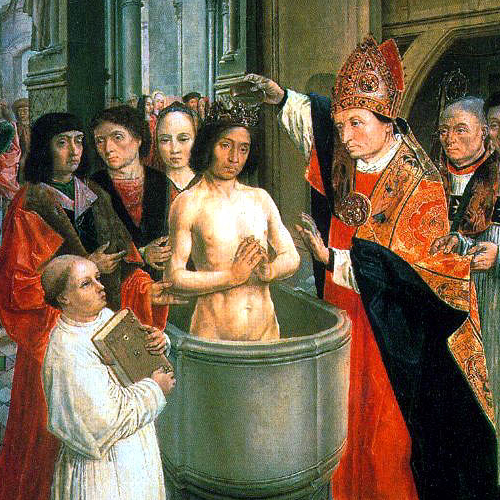 Saint Remigius baptizes Clovis, in a painting of ca 1500. Remember from the previous chapter that this devout man rid himself of potential challengers by killing not only them, but also their male descendants? O tempora, o mores! And to believe that this first king of France may be an ancestor of yours ... (Source) 18 Thus wrote Gregory of Tours and he continued: "Then the queen asked saint Remi, bishop of Rheims, to su mmon Clovis secretly, urging him to introduce the king to the word of salvation. And the bishop sent for him secretly and began to urge him to believe in the true God, maker of heaven and earth, and to cease worshipping idols, which could help neither themselves nor any one else. But the king said: 'I gladly hear you, most holy father; but there remains one thing: the people who follow me cannot endure to abandon their gods; but I shall go and speak to them according to your words.' He met with his followers, but before he could speak the power of God anticipated him, and all the people cried out together: 'O pious king, we reject our mortal gods, and we are ready to follow the immortal God whom Remi preaches.' This was reported to the bishop, who was greatly rejoiced, and bade them get ready the baptismal font. The squares were shaded with tapestried canopies, the churches adorned with white curtains, the baptistery set in order, the aroma of incense spread, candles of fragrant odor burned brightly, and the whole shrine of the baptistery was filled with a divine fragrance: and the Lord gave such grace to those who stood by that they thought they were placed amid the odors of paradise. And the king was the first to ask to be baptized by the bishop.... And so the king confessed all-powerful God in the Trinity, and was baptized in the name of the Father, Son and holy Spirit, and was anointed with the holy ointment with the sign of the cross of Christ. And of his army of more than 3000 were baptized." 19 Further: "I wish, if it is agreeable, to make a brief comparison of the successes that have come to Christians who confess the blessed Trinity and the ruin which has come to heretics who have tried to destroy the same.... Arius, who was the first wicked inventor of this wicked sect, was subjected to infernal fires after he had lost his entrails in a privy. But Hilarius, the blessed defender of the undivided Trinity, though sent into exile for its sake, was restored both to his native land and to Paradise. King Clovis confessed it, and crushed the heretics [i.e. the Alimanii who were Arians] by its aid and extended his kingdom over all the Gauls; Alaric, on the other hand, who denied it, was deprived of kingdom and people, and what is more, of eternal life itself. And to true believers, even if through the plots of the enemy they lose something, the Lord restores it a hundred fold, but heretics do not gain any advantage, but what they seem to have is taken from them. This is proved by the deaths of Godegisel, Gundobad, and Godomar, who at the same time lost their country and their souls. But we confess one God, invisible, infinite, incomprehensible, glorious, always the same, and everlasting, one in Trinity in respect to the number of persons, that is, the Father, the Son and the Holy Spirit; we confess him also triple in unity in respect to equality of substance deity, omnipotence or power, the one greatest omnipotent God ruling for eternal centuries." 20 As a bishop in Merovingian Gaul, Gregory shouldered great responsibility and wielded great power. Once elected, bishops had security of tenure. In contrast, those in positions of secular authority, quite apart from the likelyhood of being killed in battle, were liable to be deposed at any moment, have their lands or properties taken, be tortured to death in the most inhuman and bestial way whether or not guilty of any charge levied against them. Bishops were the upholders of the Catholic faith as well as defenders of public morality. They had many properties to administer, numerous servants to govern and vast lands to cultivate. They exercised the dread power of excommunication; and their church buildings were places for sanctuary for all men. Bishop Gregory, among his many and varied activities, discovered, identified, blew the dust off and placed on suitable vantage points jars full of putrefying relics. 21 The previous paragraph has been extracted from an introduction by Lewis Thorpe to another, more recent translation of History of the Franks, a story, Thorpe writes, "splattered with blood and festering puss, it re-echoes with the animal screams of men and women being tortured unto death: yet Gregory never once questions this effective method of extracting confession, implicating confederates, or simply satisfying the blood-lust of Queens and Kings. For all that, he was a man of deep compassion." 22  Saint-Julien-le-Pauvre, in Paris, replaced a Merovingian refuge for pilgrims or an older church dating back to the 6th century. The earliest mention of such a site was made by Gregory, bishop of Tours, who resided there during the rule of Chilperic I, king of Neustria. The new building was begun around 1165–1170. (Source) 23 Of great concern to the bishop were false healers and self-announced Christs. Here from Gregory's History: "There was ... in the city of Tours a man named Desiderius who claimed to be great and said he could do many miracles. He boasted too that messengers were kept busy going to and fro between him and the apostles Peter and Paul. He wore a hood and a goat'shair shirt and in public he was abstemious in eating and drinking, but in secret when he had come to his lodgings he would stuff his mouth so that his servant could not carry food to him as fast as he asked for it. But his trickery was exposed and stopped by our people and he was cast out from the territory of the city. We did not know then where he went, but he said he was a citizen of Bordeaux. Now seven years before there had been another great impostor who deceived many by his tricks. He wore a sleeveless shirt and over it a robe of fine stuff and carried a cross from which hung little bottles which contained as he said holy oil. He said that he came from the Spains and was bringing relics of the blessed martyrs Vincent the deacon and Felix. He arrived at Tours at the church of Saint Martin in the evening when we were sitting at dinner, and sent an order saying: 'Let them come to see the holy relics.' As the hour was late I replied: 'Let the blessed relics rest on the altar and we will go to see them in the morning.' But he arose at the first break of day and without waiting for me came with his cross and appeared in my cell. I was amazed and wondered at his hardihood and asked what this meant. He answered in a proud and haughty voice: 'You should have given me a better welcome; I'll carry this to the ears of king Chilperic; he will avenge this contemptuous treatment of me.' He paid no more attention to me but went into the oratory and said a verse, then a second and a third, began the prayer and finished it, all by himself, then took up his cross again and went off. He had a rude style of speech and was free with disgusting and obscene terms and not a sensible word came from him. He went on to Paris. In those days the public prayers were being held that are usually held before the holy day of the Lord's ascension. And as bishop Ragnemod was walking in procession with his people and making the round of the holy places, this person came with his cross and appearing among the people with his unusual clothing, he gathered the prostitutes and women of the lower class and formed band of his own and made an attempt to walk in procession to the holy places with his multitude. The bishop saw this and sent his archdeacon to say: 'If you have relics of the saints to show, place them for a little in the church and celebrate the holidays with us, and when the rites are finished you shall go on your way.' But he paid little attention to what the archdeacon said but began to abuse and revile the bishop. The bishop saw that he was an impostor and ordered him shut up in a cell. And examining all he had, he found a great bag full of roots of different herbs and also there were moles' teeth, the bones of mice, the claws and fat of bears. He knew that these were the means of sorcery and ordered them all thrown into the river; he took his cross away and ordered him to be driven from the territory of Paris. But be made himself a second cross and began to do what he had done before, but was captured and put in chains by the archdeacon and kept in custody. In these days I had corne to Paris and had my lodging at the church of the blessed martyr Julian. The following night the wretch broke out of prison and hastened to Saint Julian's Church just mentioned, wearing the chains with which he was bound, and fell on the pavement where I had been accustomed to stand and, overwhelmed with drowsiness and wine, he fell asleep. Unaware of this I rose at midnight to return thanks to God and found him sleeping. And such a stench came from him that that stench surpassed the stenches of all sewers and privies. I was unable to go into the church because of the stench. And one of the clergy came holding his nose and tried to wake him but could not; for the wretch was so intoxicated. Then four of the clergy came and lifted him and threw him into one corner of the church, and they brought water and washed the pavement and scattered sweet-smelling herbs on it and so I went in to offer the regular prayers. But he could not be wakened even when we sang the psalms until with the coming of day the sun's torch climbed higher. There, I surrendered him to the bishop with a request for his pardon. When the bishops assembled at Paris I told this at dinner and bade him be brought to receive correction. And when he stood by, Amelius, bishop of Tarbes, looked at him and recognized him as his slave who had run away. He secured his pardon and so took him back to his native place. There are many who practise these impostures and continually lead the common people into error. It is of these I think that the Lord says in the Gospel that in the latest times false Christs and false prophets shall arise who shall do signs and wonders and lead the very elect into error." 24 History of the Franks makes fascinating reading for it gives a feel of the times as conveyed by an eyewitness in touch with all layers of society—one who came from an extensive family of, both, high ranking clerics and aristocrats, one who mediated between kings, one who served the wretched as well, and who did all he could to uphold the Catholic faith as he understood it. Fascinating also, and this just as an aside, how much correspondence there is between the mores of "our" medieval society with today's societies in the Middle East and East Africa—and I'll keep mum on hte Nazi regime. 25 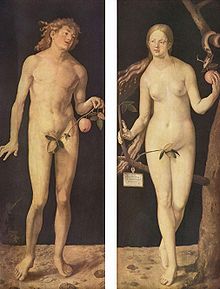 Adam and Eve by Albrecht Dührer (1471–1521). Adam, before partaking from the apple, typified the Redeemer. (Source) 26 I am particularly puzzled just how the religious pronouncements of one man, whether or not truly a historical figure as portrayed today, be he Moses or Jesus or Muhammed, came to have such world-shaking consequences; how belief in goodness got to be married to extreme intolerance; how to this very day volumes are written about whether biblical texts should be taken literally or interpreted as allegorical. Saint Augustine and Saint Gregory of Tours way back in the fourth and sixth centuries considered many biblical stories to be of an allegorical bent. An, in the context of this chapter, relevant example is found in Bishop Gregory's History, book I, chapter 1: "And while he [Adam] slept a rib was taken from him and the woman, Eve, was created. There is no doubt that this first man Adam before he sinned typified the Redeemer. For as the Redeemer slept in the stupor of suffering and caused water and blood to issue from his side, he brought into existence the virgin and unspotted church, redeemed by blood, purified by water ...." Our Jewish friends may beg to disagree. But things be as they may, religion and religious reflections on the afterlife have been, and presumably still are, high on the minds of many a Merckelbach whether or not a churchgoing member of society. As it was on the mind of Adriaan Märckelbach, especially during the dark hours of his life. 30 Whence this chapter. 28 Bibliography
About Saint Gregory. An on-line copy of History of the Franks. About Saint Martin. From History of the Franks: "The good king Guntram first took a concubine Veneranda, a slave belonging to one of his people, by whom he had a son Gundobad. Later he married Marcatrude, daughter of Magnar, and sent his son Gundobad to Orléans. But after she had a son Marcatrude was jealous, and proceeded to bring about Gundobad's death. She sent poison, they say, and poisoned his drink. And upon his death, by God's judgment she lost the son she had and incurred the hate of the king, was dismissed by him, and died not long after. After her, he took Austerchild, also named Bobilla. He had by her two sons, of whom the older was called Clothar and the younger Chlodomer." More about Guntram (proclaimed Saint Guntram shortly after his death), see here. Click here for details of the Salic Code. fn5 See Peter T. Leeson, Ordeals. The word ordeal has the meaning of "judgment, verdict." fn6
|
--
| top of page |
|
Page maintenance:
Page format:monh xx, 2015
Story edit:
To be checked for timeliness:
¶ none
Reminders:
¶ none
Linkcheck: not done
XHTML verify: not done
Backups: month. 25, 2011

